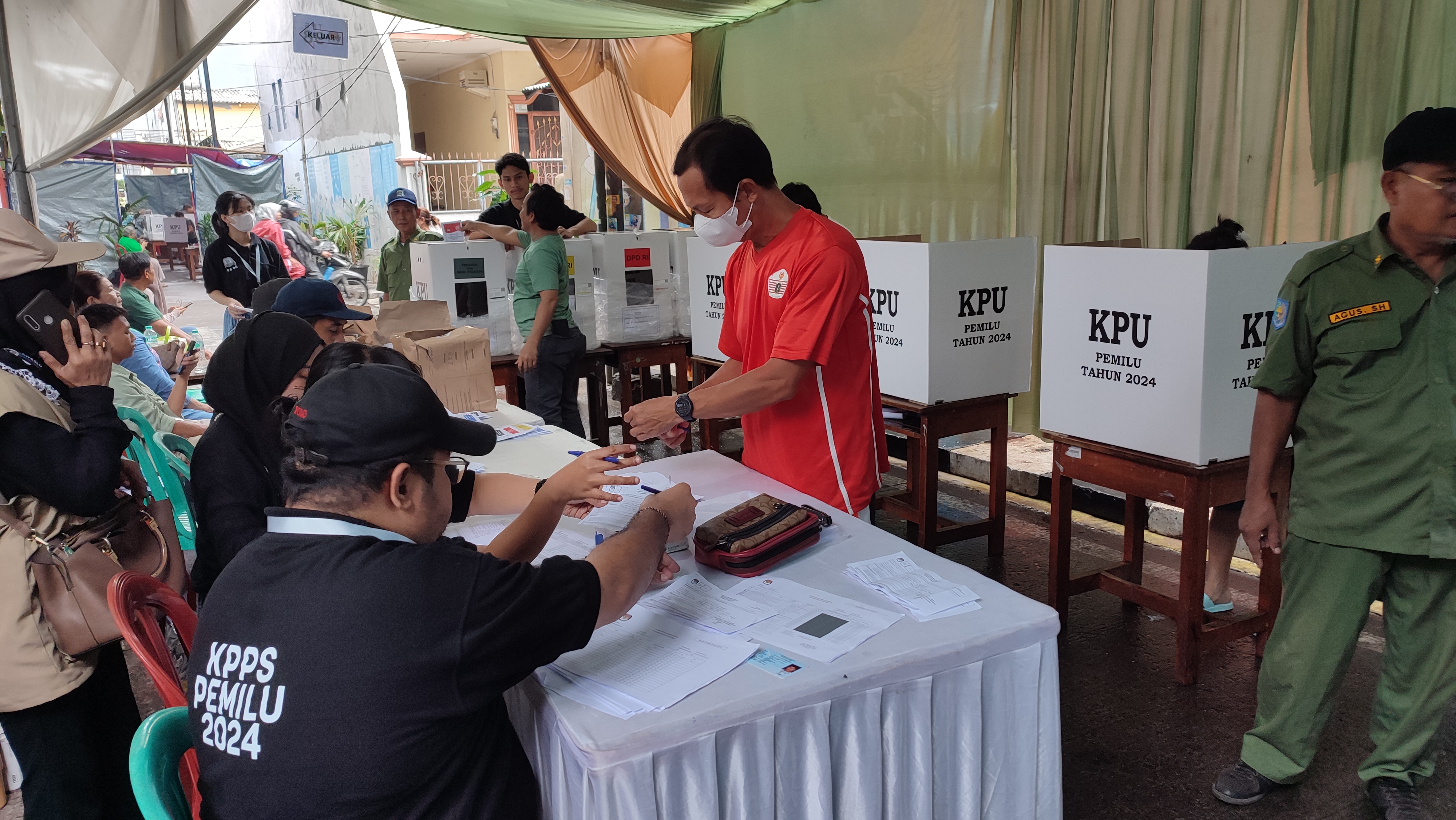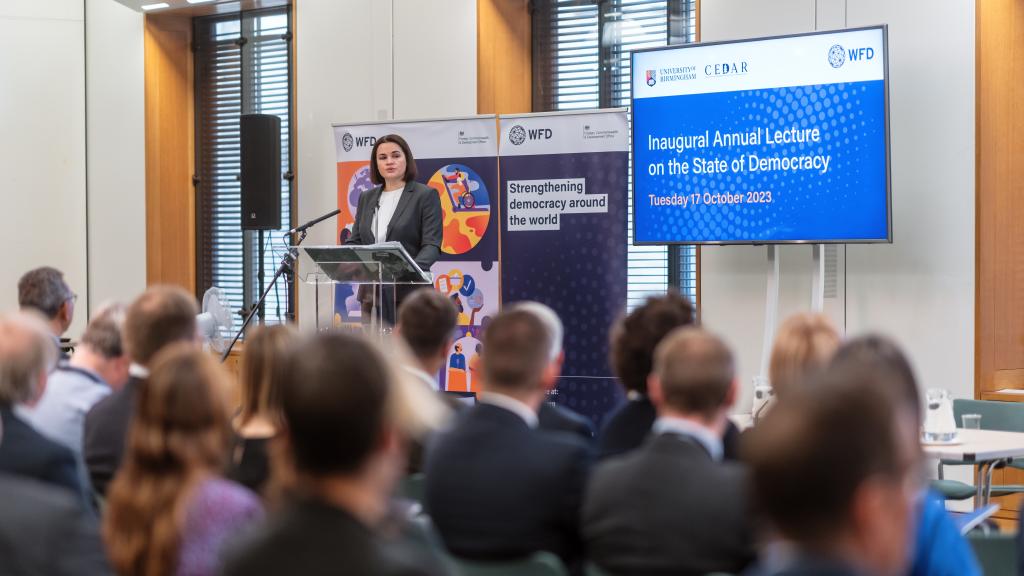Past events

As part of the 16 Days of Activism against Gender-based Violence (a global campaign held in all countries of the world from the period of 25 November to 10 December), UN Women and Westminster Foundation for Democracy (WFD) in collaboration with the Women Parliamentary Caucus of the Republic of Indonesia will be holding a discussion forum on violence against women in politics (VAWP) with national stakeholders, including the Election Commission, Members of Parliament, relevant government and ministry representatives, gender equality advocates, civil society organisations working on elections and politics, and development partners.
This dialogue will provide an opportunity to reflect on how VAWP affects women during elections and in the political arena, how it is treated, and how it can be better addressed in the future. Moreover, this event will raise awareness on VAWP to make people recognise the violence, break the silence, and prevent it from happening.
The event will be hybrid with in-person participation by participants in Jakarta and online participation available. Simultaneous interpretation in English and Indonesian will be provided. The event will take place from 9.00am to 1.00pm WIB.

How can parliaments protect the environment? This free online event will explore how environmental issues are becoming increasingly hard to ignore. More extreme weather patterns, rising sea levels and wide-spread pollution complicate everyday lives of millions of people around the world, but governments’ action on these issues is often slow. This raises concerns that the longer we wait to act on environment, the more likely we are to find ourselves in crisis conditions that require swift action at the expense of democratic governance.
Parliaments play an important role in democratic policymaking, but they are already getting bypassed when it comes to environmental action. To examine the extent to which parliaments protect the environment, this event launches a report which examines single-use plastic (SUP) bans in 32 countries and three in-depth case studies of Barbados, Kenya and Thailand. The report suggests that legislatures can play an important role in environmental policymaking and that promoting swift environmental action at the expense of democratic governance does not always pay dividends.
Join the report's lead author, Dr Petra Alderman (University of Birmingham) as she outlines the main findings, in conversation with WFD's Environmental Democracy Advisor, Rafael Jimenez Aybar. The event will also feature remarks from experts involved in the research, including HE Professor Judi Wakhungu (former Minister of Environment and Natural Resources, Kenya) and Nikola Simpson (Head of the Blue Economy Accelerator Lab, UNDP).
You can now read the report in full.

On International Democracy Day 2022, the Global Democracy Coalition will hold an event to celebrate democracy activism and democracy defenders of different kinds across varying contexts, and to discuss the most effective ways to support them, to advance and protect democracy worldwide, showcasing stories and examples from partner organizations in the Global Democracy Coalition and their democracy defenders grantees/partners.
WFD's CEO, Anthony Smith will be speaking at the event discussing WFD's work and how strategies and programming are shifting to address new challenges.
The event aims to show how the defense of democracy takes different shapes and forms across varying contexts but will also seek to tease out commonalities and prevalent challenges and strategies to learn from each other. The discussion will also provide inputs to democracy assistance organizations from the Global Democracy Coalition from the United States, Europe, and Latin America so that they can more effectively support the efforts of different types of democracy defenders and also learn from each other.

Post-legislative scrutiny (PLS) is the practice of monitoring the implementation and evaluating the impact of laws. The aim is to ensure that laws benefit citizens in the way originally intended by lawmakers. PLS is often carried out by parliamentary committees. WFD has helped parliaments around the world pioneer post-legislative scrutiny.
The Advanced Course on Post-Legislative Scrutiny (PLS), delivered in partnership with the Institute of Advanced Legal Studies, explores in-depth the theory and practice of PLS as an oversight tool. The course adopts a holistic outlook that places PLS in the legislative cycle.

When it comes to the urgency and actions needed to combat climate change and environmental crises, the science is clear. However, political systems lag behind.
Governance and political failures, whether they are a lack of political will, short-terminism or weak accountability, undermine the effectiveness of climate action support or environmental programmes. Despite this, traditionally most development programmes treat strengthening democracy or governance separately to environmental protection.
This event will launch research commissioned by WFD from the Grantham Institute at the London School of Economics, around the Conference on Environmental Democracy which took place from 29-31 March 2022. The study explores how a greater focus on environmental democracy and governance may help address climate change and environmental degradation.
Speakers will include the lead author, Dr Alina Averchenkova (LSE), and Alicia Forsyth, Head of the Climate Strategy and Co-ordination Department at the FCDO.

Legislative bodies are the national institution most closely linked to constituent demands and a vital part of national fiscal accountability ecosystems. In most countries, however, especially during the COVID-19 pandemic, parliaments have found themselves sidelined during loan approval processes and with limited opportunity for oversight of loan-financed projects.
Hosted in partnership with The National Democratic Institute (NDI), this event will convene members of parliament and debt experts to explore and highlight the essential responsibilities of parliaments throughout the budget cycle. The session will explore global perspectives surrounding public debt and parliamentary oversight as well as the importance of parliaments to play an active role in debt oversight. The webinar will also feature an introduction to the global resource on the role of parliaments in public debt management and transparency, developed by NDI and WFD.

Join us on Friday, 14 March 2025, for an inter-active webinar, organised by the Global Community of Practice on PLS in cooperation with the Parliament of South Africa, Chamber of Deputies of Chile and the University of London, on gender-sensitive impact assessments of legislation.

The Electoral Integrity Project and WFD are pleased to announce a significant three-day online workshop examining electoral reform and democratic practices globally.

The Democracy Action Partnership (DAP) 2024 focuses on WFD’s extensive research on the Cost of Politics - the costs of running for and maintaining political office.

Join us for an engaging webinar with Dr. Tom Caygill, author of a recent report on Post-Legislative Scrutiny (PLS) in the Scottish Parliament. Discover how PLS serves as a powerful tool to assess the real-world impact of legislation long after it becomes law.

